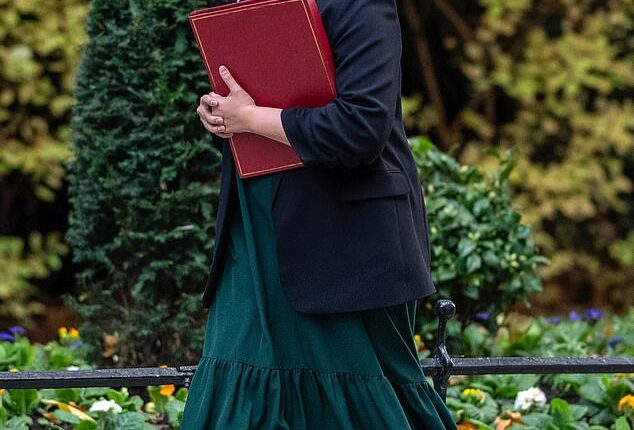Labour has been plunged into yet further chaos as its left wing looked set to battle any moves by Home Secretary Shabana Mahmood to tighten immigration laws.
Ms Mahmood is said to be considering adopting similar hardline rules to the centre left Danish government to deal with the UK’s spiralling migrant crisis.
Such a system could see even genuine asylum seekers granted only temporary status to remain in the UK until they could safely return to their own countries as well as tighter family reunification rules to prevent abuse of the system and even a financial incentive system to encourage repatriation.
But Labour MP Nadia Whittome has said that the Labour Government should ‘not be flirting with’ a Danish style asylum shake up, condemning the Danish policies as all ‘undeniably racist’.
Ms Whittome, a member of the party’s Socialist Campaign Group, said it would be a ‘dangerous’ path for the party to go down if it attempted to emulate Denmark’s tough stance on asylum seekers which has seen its immigration levels drop to a 40-year low.
Her comments follow BBC reports that the Ms Mahmood dispatched Home Office officials to Copenhagen in the wake of the ruling party’s defeat of a populist right wing party by adopting tough new immigration laws to look at the Danish system.
The MP for Nottingham East said the policies of the Danish government were ‘the policies of the hard right’ and were ‘not the kind of model that we should be looking to emulate’.
‘I think that these are the policies of the far right – I don’t think anyone wants to see a Labour government flirting with them,’ she said.

The Home Secretary Shabana Mahmood (pictured) is set to announce a huge shake-up of the UK’s immigration system

Border Force escort people thought to be migrants into Dover Docks, Kent, on Saturday
Ms Whittome, 29, who became the youngest MP in the House of Commons when she was elected in 2019 at the age of 23, told BBC Radio 4’s Today programme:
‘These policies would be more at home in the far right than in any centre left government – some of them are undeniably racist policies.’
And she suggested that adopting any of the Danish policies could lead to the adoption of anti-ghettoization ones such as ‘policies like not allowing people to move to certain housing areas’.
‘All of these policies are discriminatory and what I am outlining is the dangerous path that they lead us down.’
But in a sign of a likely schism in party thinking, one of the so-called ‘Red Wall MPs’, Gareth Snell said he thought it was worth Labour exploring ‘best practice from its sister parties around the world’ in looking for a solution to the migrant crisis.
And the MP for Stoke-on-Trent Central warned the issue was currently preventing his constituents from bringing up anything else that mattered to them because it was so predominant in people’s minds.
He said: ‘We are looking into trying to put some fairness and credibility into an asylum and migration system in this country which my constituents look at and think of as inherently unfair so I think it’s worth exploring.
‘It is worth looking at what best practice we can find from our sister parties around the world and where they have managed to find practical solutions to the thorny issue of how you manage migration and asylum in a way that allows you domestically to talk to your constituents.’
Mr Snell said he also believed the Labour Party should support ways of migrants returning home when their countries were safe.
‘If there is an opportunity for them to return to their home country to be part of a rebuilding or a re-establishment of their home countries to ones they recognise, then we should support that,’ he said.
And he agreed that where people who applied for asylum ‘understood it was a temporary arrangement to give you shelter, help and support whilst it is needed’ then it was ‘not inherently unfair to have your return facilitated for you’ although he admitted he would have concerns and he believed his constituents would about that being ‘conditional on large sums of money being paid’.
In the Danish system, an equivalent of up to £24,000 is paid to migrants agreeing to go home, according to the BBC.

Gareth Snell – MP for Stoke-on-Trent Central – is one of the so-called ‘Red Wall MPs’ who believes the government should explore ‘best practice from its sister parties around the world’
Looking at the way Denmark was treating family reunification, Mr Snell said a fair system should also be looked at for the UK.
‘Denmark is a much smaller country than the UK so we need to look at it from a UK context and from my own constituency casework, I know that it is quite difficult in some cases to go through the reunification process but we have to be quite sensible about to what extent we allow family relations as grounds to have family into the UK.
‘We need to look at whether it is immediate family, is it children, is it a spouse – is it a distant relative – we have to quite practical and rational about where we draw the line.’
Denmark has seen a massive reduction in asylum applications, which reached a 40-year low earlier this year, under the Social Democrats, Labour’s sister party led, by Prime Minister Mette Frederiksen.
Since coming to power in 2019, Frederiksen has made tackling immigration a key priority, vowing to pursue a ‘zero-refugee’ policy that involves actively discouraging people from coming to the country.
Despite Denmark’s rules remaining controversial, no one can deny its success, with asylum claims dropping by almost 90 per cent over the past decade. Last year they plummeted to 2,333, while the UK total hit a record 108,138.
It marks a major shift from Denmark’s 2015 migration crisis, when annual asylum requests reached 21,316 in a country of only six million.
Some of the country’s policies have been accused of being discriminatory while others appear to quite deliberately introduce a hostile environment for migrants.
Asylum seekers refused the right to stay are denied benefits. They get food, served three times a day, at the country’s two deportation camps They are sent to the camps to await removal by the Danish Returns Agency, which gets extra funds for results.
And if a migrant’s country of origin is deemed ‘safe’, even a successful asylum seeker can lose Danish residency and face being returned home.
Senior Home Office officials visited Copenhagen last month to examine what lessons could be learnt from their immigration system, according to the BBC.
They are said to be particularly interested in how Denmark has restricted family reunification, which is often a major incentive for seeking asylum.
In September, the UK Government announced that new applications to the existing refugee family reunion route would be suspended as they work up new rules.
The family reunion visa route allows people granted asylum or humanitarian protection in the UK to apply to bring immediate family to join them.
Unlike other migrants applying for asylum, they would not have to fulfil the income and English-language tests required to stay in the UK.
Mahmood will supposedly not go as far as Denmark when she introduces reforms to family reunion routes, although it is believed measures will be more restrictive.
Rasmus Stoklund, Denmark’s minister for Immigration and Integration, said cracking down on immigration and enforcing stricter integration rules was key to protecting the nature of Danish society.
He told the BBC: ‘We expect people who come here to participate and contribute positively and if they don’t, they aren’t welcome.’

Prime Minister Sir Keir Starmer greets Denmark’s Prime Minister Mette Frederiksen in London during a meeting last month

Rasmus Stoklund, who is Denmark’s minister for Immigration and Integration
Other deterrents Mahmood could introduce include plans to force small boat migrants to repay their hotel and benefit costs if granted asylum.
The policy, which would act like a ‘student loan repayment’ is being back by Labour MPs in the ‘Red Wall’, who are under threat from Reform.
in 2015, Denmark paralleled the UK’s political landscape as the anti-immigration Danish People’s Party began surging in the polls amid record levels of immigration.
The latest polling in Denmark shows that the Social Democrats remain by far the most popular party, with 22.9 per cent of the vote – nearly 10 points ahead of the second-biggest rival.
By contrast, the Danish People’s Party, which is usually described as far-Right, is on just 4.4 per cent, down from 21.1 per cent ten years ago.








